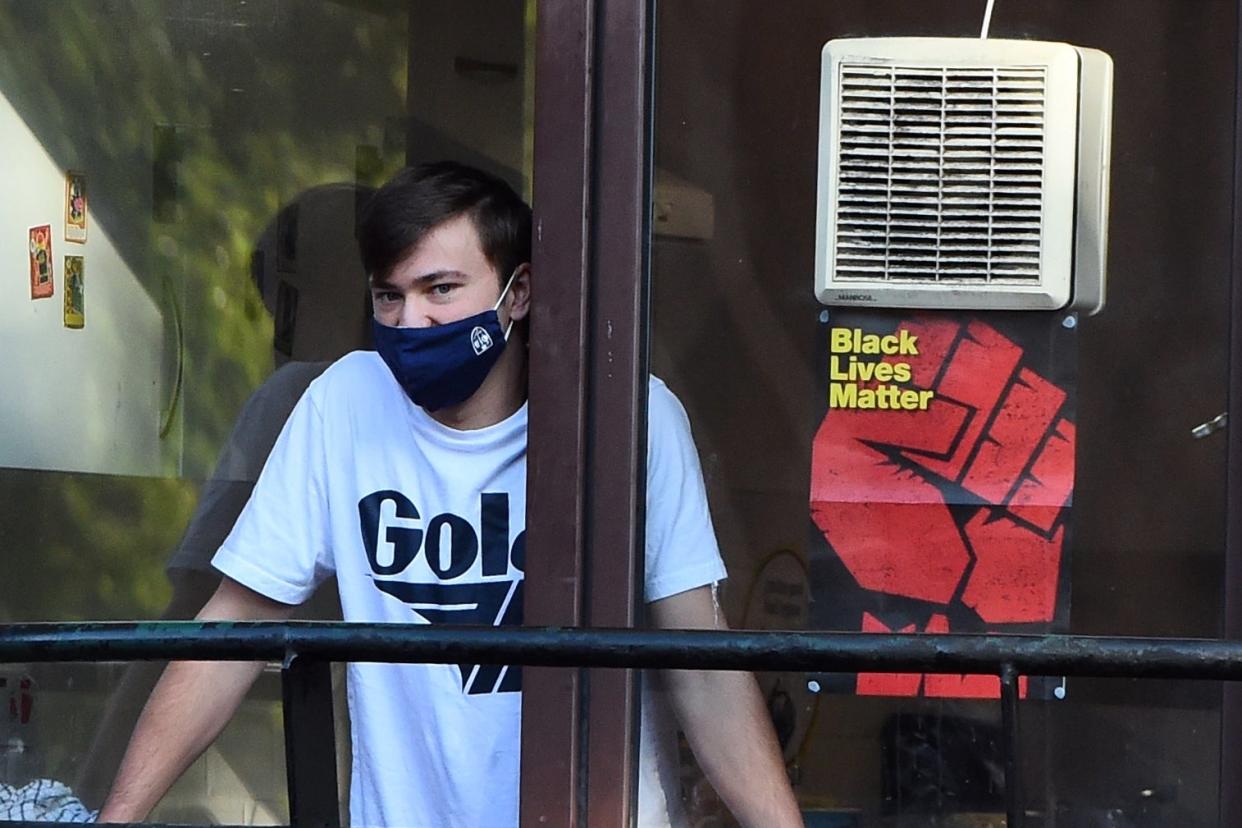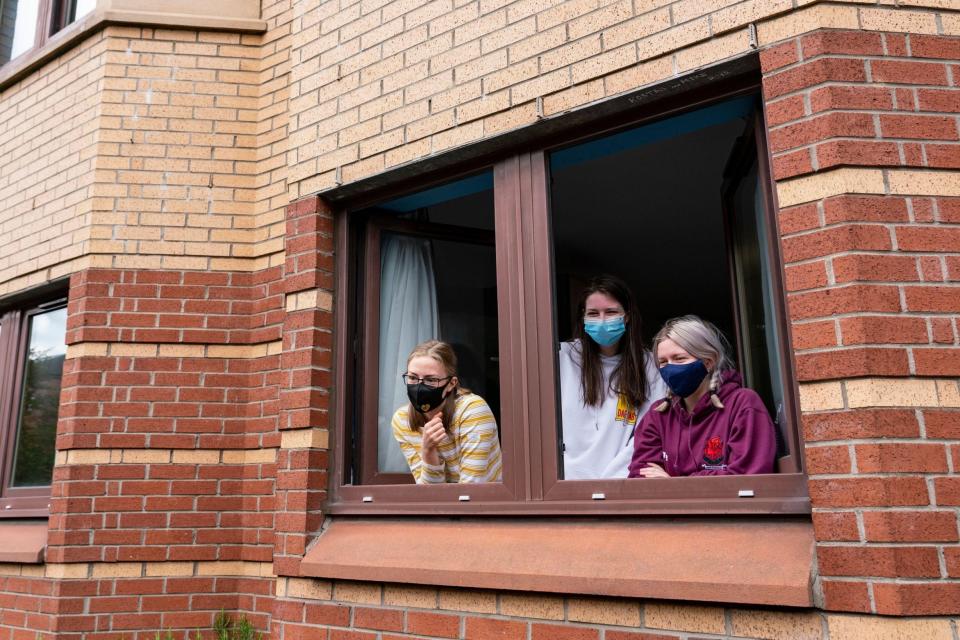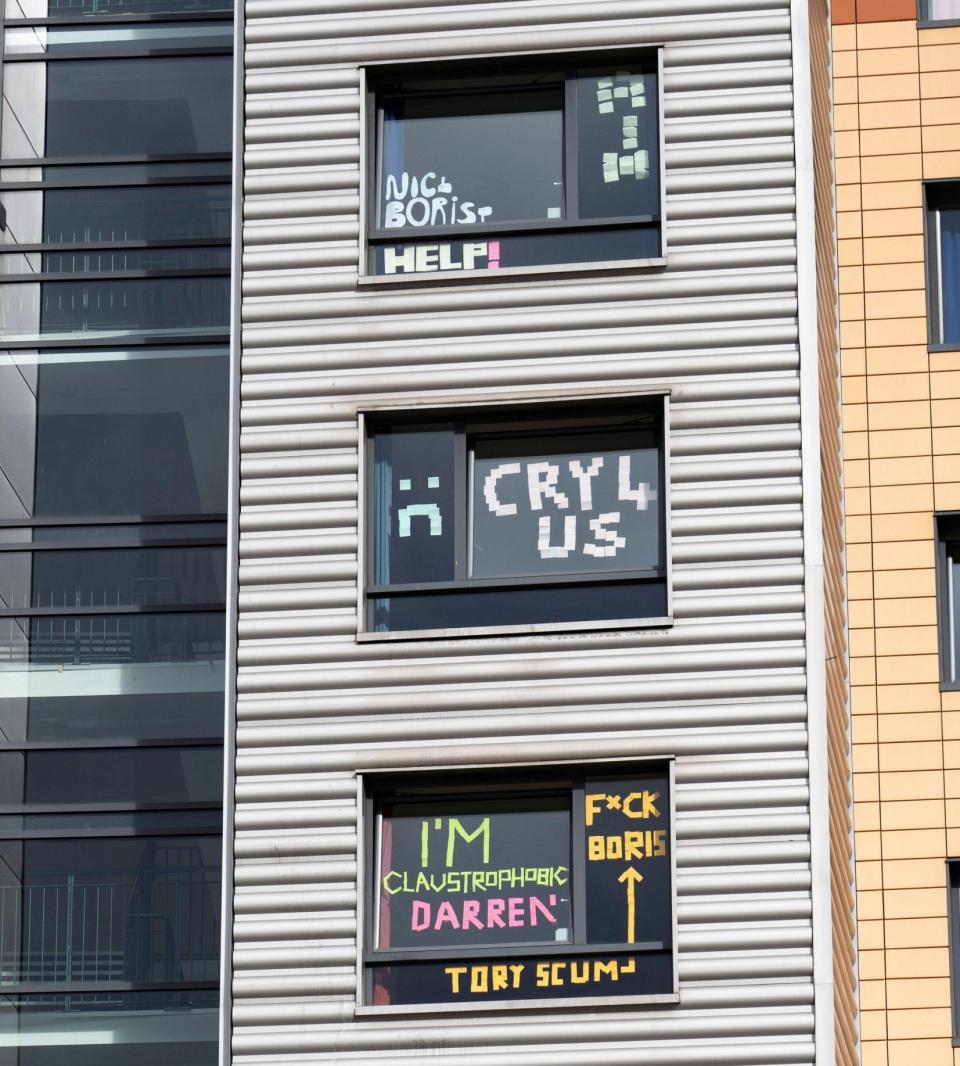We're paying £9,000 a year to be in prison, say students stuck in halls

When Harry Butcher, 19, lost his summer job at home in Kent over lockdown, he pictured his new life at Glasgow University to be a “glimmer of hope on the horizon” after a difficult pandemic. Instead, he and his fellow freshers have been made to feel like criminals.
Police, security and the media have swarmed around his halls of residence for the past two weeks, he can’t see friends or family, and he and about 600 other self-isolating students might not be allowed home at Christmas amid rising infections (172 students there have tested positive). “Is this a student hall or the set of a prison documentary?” asks Butcher.
At Manchester Metropolitan University, where 127 students have tested positive, human rights lawyers have questioned whether the lockdown enforced by security staff is even legal.
Signs in isolating freshers’ windows read: “Let us out!”, “f** Boris” and “Tories out”. Another simply asks: “Refund?” amid calls to repay £9,000 tuition fees. The Government today said students should speak to their universities if they want to reclaim tuition fees, while Glasgow will offer a four-week rent rebate to students in halls in recognition of the “difficult circumstances”.
But difficult hardly covers the physical and mental health pressures students are under, says Butcher. Since higher education chiefs declared universities safe to reopen last month, students have been returning to campuses under new Covid restrictions including bans on parties, flatmate “bubbles” and in extreme cases, campus lockdowns in which they can’t leave their rooms.
In Newcastle and Manchester, students can expect rules to be enforced by police patrols and security marshals, while more than a dozen institutions have ramped up testing. Nottingham is running campus testing facilities to monitor for an outbreak, while Exeter has introduced its own private tests.
Still, on many campuses, security measures have not been enough to halt infections. Illegal freshers’ parties and the relocation of thousands of young people across the UK have triggered a spike in cases: at least 23 universities from St Andrews to Liverpool have reported outbreaks.
Naturally, some students are ignoring university rules: at King’s College London’s catered halls in Stratford, multiple freshers have been fined for hosting rooftop parties, says Kasey Ward, a first-year film student. Ward, 19, likes the people in her flat but Covid restrictions have forced her into some difficult social situations. One flatmate has started bringing outsiders into the bubble, which she reported to reception because of another flatmate being high-risk. “But you don’t want to get a reputation as a snitch,” she sighs.

It’s a sad way to start what should be an exciting time, says Liv Facey, a first year English student at King’s who was promised a “blended” timetable of recorded lectures and in-person seminars but arrived to find all learning would be online — a particular blow for students from overseas. Facey has been using the university’s Instagram network to arrange meet-ups with course mates, but it’s shyer students she feels sorry for. Last week, her tutor “practically had to beg” some members of her seminar to turn their cameras on.
St Andrews Maths student Sophie Palmer, 19, agrees. Part of the reason she chose St Andrews over UCL was its presumed Covid safety over a city university.
As it turns out, she’s more locked down than she would have been in the capital. “It’s been so bizarre,” says Palmer, looking back on two weeks of beach gatherings, bonfires and coastal walks. “Everyone went a bit crazy over the first few days,” so she wasn’t surprised when all students received an email two Fridays ago announcing a university-wide lockdown. Now she can only mix with her “household” — the 12 people sharing three bathrooms in her halls — and it’s two students per table at meal times.
“It’s kind of depressing, you have to shout if you want to talk to someone,” she laughs. Queues for meals take 40 minutes as track and trace forms have to be filled out.

Syreha Allen, 19, a sports science student at Queen Mary University of London, says she partied “too hard” on her gap year so isn’t stressed about an 80 per cent virtual freshers’ week.
Indeed, a more “wholesome” freshers’ is something many hope will outlast the pandemic.
For many, the question is whether the online university experience is worth it. Facey says she would have gone down the Open University route or done a short-course in journalism had she known the pandemic was coming. Others are happy to embrace the new normal for now. Palmer is already buzzing for the day in-person teaching and partying starts again. “People will throw themselves in with the same levels of enthusiasm that they would have done in week one,” she says, optimistically.
Read more
New fines come into force as No 10 'considers emergency lockdown'-LIVE
Minister won't rule out keeping students in halls for Christmas

